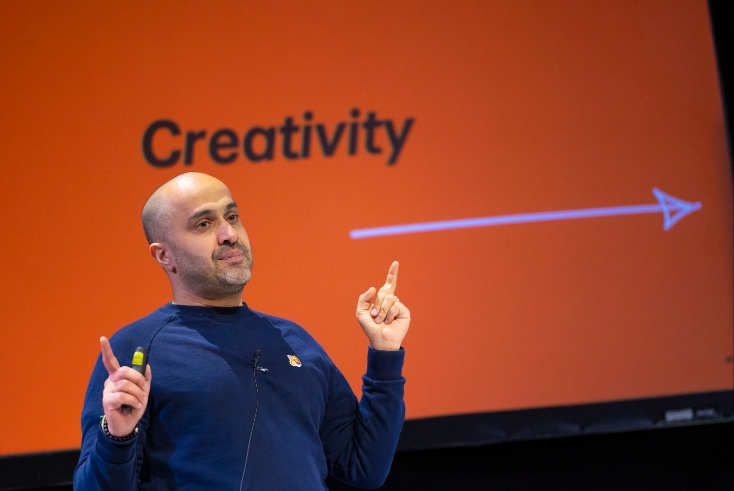Dara Nasr: ‘Let’s make everything fun again’


Advertising needs to get back to fun and creativity to help both people and businesses.
This was the argument of former Twitter UK managing director Dara Nasr, who was speaking at the IAB’s annual Engage event on the joy of creativity and the link between creativity, attention and fun — not just in digital advertising but in the workplace.
Nasr, now vice-president of global sales at WeTransfer Advertising, told delegates: “It’s very, very important that we try to make the internet as fun as it’s ever been, because what we know is that joy and creativity, or the joy of creativity, does help us as individuals, advertisers, consumers and businesses.
“Because you can reach the right people who are engaged in a positive mindset. And, guess what, you can reach the right people who are engaged in a positive mindset for longer.”
Creativity was “one of the key reasons” he joined WeTransfer and focusing on creativity is more important than ever.
Nasr observed: “What we used to say is that social media is very much like holding a mirror up to society. And society, I think, is less fun.
“A lot happened since 2012 and politically, economically, it is more divisive, so let’s make everything fun again, because that’s the key thing. It is hard enough to laugh seven times a day, let alone 17 or 300, and I think that’s the biggest failure we can do to ourselves.”
Not only that, but as attention is finite and a Forbes study found that the average human is exposed to 6,000-10,000 ads per day, people want to be attentive to “something that is creative, that is beautiful, that is memorable”.
“This is where we go full circle back to fun,” Nasr continued. “Have attention metrics that are positive, because what we find is that you tend to benefit more when you are in a positive mindset. You tend to be more leaned in and I think mindset is critically important. Doomscrolling didn’t exist before and Kantar says it’s one of the most under-appreciated truths in retail that happiness or positivity drives sales.”
Nasr also cited Albert Einstein and Sir Ken Robinson, emphasising the importance of creativity not just for advertising but for society and humanity.
Einstein said “creativity is intelligence having fun”, while Robinson believes that “creativity for children is as important as literacy”.
Nasr described how he chose between two job offers when he started his career: a very big TV company and a tiny one.
“To the continuing disappointment of my parents, I chose the tiny one that no-one knew and I did it for one reason: everyone in the interview process, everyone in the office, seemed to be having fun — they seemed to be happy and that was amazing,” he said.
“Now, what I’ve learned over those years is that was an amazing choice, because if you’ve got to work for 70% of the week, or 70% of your life, if you can do so somewhere that makes you happy, where there is fun, you should take that decision just for your own soul.”
In a nod to the current situation at X, Nasr also reflected on his time at Twitter, which he joined in 2012, calling that time “simpler days” when “everything seemed much more fun”.
He said: “You didn’t have to have an opinion. You didn’t have to take a side. It was the same on Insta, the same everywhere — you could just be creative. You could be adventurous, curious, interactive, chaotic maybe — but it was more fun.”
